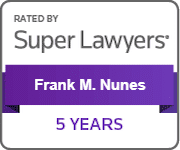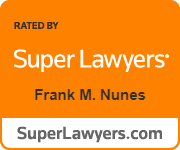CAR ACCIDENT ATTORNEYS IN FRESNO, CALIFORNIA
At Nunes Law, Inc., our car accident lawyers in Fresno, California, understand how difficult it is to pursue financial recovery from an insurance company. After all, our founder and lead attorney, Frank Nunes, was once in-house counsel for a leading national insurance company.
Since 2007, our Fresno car accident law firm has been putting that knowledge to work for our Fresno County, Kings County, Kern County, Madera County, Merced County, and Tulare County residents so that they can face the negligent driver and their insurance companies with confidence.
Our personal injury attorneys in Fresno understand our client’s injuries can take a significant toll on both their physical and emotional wellness, which is why we work tirelessly to improve and empower their position.
We distinguish ourselves from other law firms by providing precise, customized legal care to each case we represent, such as injury victims do not have to handle their cases independently.
HOW MANY PEOPLE ARE INJURED OR KILLED IN AUTO ACCIDENTS IN CALIFORNIA EACH YEAR?
California is notorious for its congested traffic patterns, which can quickly become accidents when drivers are distracted, speeding, or impaired.
According to the California Office of Traffic Safety, on average last year throughout our state:
- A traffic crash with injury or death was reported every three minutes
- One person was injured every 1 minute and 53 seconds as a result of a traffic crash
- One person was killed every 2 hours and 14 minutes as a result of a traffic crash
The National Highway Traffic Safety Administration confirmed that over 3,600 people were killed in traffic collisions during that time, and another 277,000 people were injured just in California.
Our car accident lawyers in Fresno, CA understand how difficult it is to recover from any traffic collision, as medical bills, lost wages, and miscellaneous expenses rapidly mount before our clients can even get back to work.
Do not let the stress of your collision and injuries overwhelm you. Contact our Fresno auto accident lawyers today for a free consultation to learn more about our legal approach to pursuing results for our clients.
DOES NUNES LAW, INC. HANDLE DRUNK AND DRUGGED ACCIDENTS WITH INJURIES CLAIMS?
If you are wondering whether you can make a claim against a drunk driver who caused your injuries, the answer is yes.
Because unfortunately, drunk or drugged driving accidents are more common than most think.
Last year, in California alone:
- Alcohol-impaired driving took 949 lives
- 42% of all drivers killed in motor vehicle crashes who were tested after the crash were positive for legal and/or illegal drugs
When a drunk or drugged driver causes an accident with injuries, their negligence has more than civil court consequences. They may also face criminal charges for their negligent decision to get behind the wheel.
While our Fresno car accident attorney only handles the civil side of your injury claim, filing a personal injury claim against the negligent and at-fault driver’s insurance company, we will support you throughout your restitution claim in criminal court when applicable.
During a recent drunk driving with injuries claim, our lead Fresno car accident attorney successfully supported our client, who was able to recover more than just her expenses and lost wages during our case but was also awarded our attorney’s fees during the criminal proceedings against the drunk driver who hit her.
Each auto accident case our attorneys represent is unique, as is our customized approach to pursuing results. If you have been injured in a car accident, contact our experienced Fresno auto accident lawyers today to learn more about your legal options, so you can start focusing on your physical and emotional health while we take on the insurance company.
YOU DO NOT HAVE TO PURSUE AN AUTO ACCIDENT CLAIM ON YOUR OWN
Chances are if you are searching for Fresno personal injury attorneys, you or a loved one has suffered injuries in a Fresno car accident, which means you have probably already sought medical care.
Pursuing medical care as soon as you are able after the crash occurs will be an important part of your car accident claim. Even if you return to an emergency room or your family physician after suffering from delayed symptoms from hidden injuries that were not immediately diagnosed, following all medical care requirements is the first step in pursuing a successful personal injury claim.
Partnering with an experienced car accident attorney in Fresno will allow you to focus on your medical care while we handle all communication with the insurance company, so you are not intimidated by their interviewing tactics.
We will also advise you on the proper protocol for reporting the accident to your insurance company, how to obtain a rental car and your options for exploring the financial recovery you may be entitled to from an uninsured or underinsured driver.
Each detail of your claim will be handled by our experienced auto accident attorneys in Fresno so that you can focus on your recovery.
CAN NUNES LAW, INC. HELP IF I HAVE LOST A LOVED ONE IN A FRESNO CAR ACCIDENT?
According to the Centers for Disease Control, car accidents are the number one cause of death in the United States, recording nearly 39,000 fatalities throughout the country last year alone.
At Nunes Law, Inc., we understand that if you have lost a loved one in a car accident, the statistics do not matter. You are simply trying to find a way to get through this tragic event.
Our Fresno wrongful death attorneys also know that while no amount of money will bring your loved one back, pursuing a claim against the negligent driver who caused your loss may provide the financial relief you need to grieve fully.
In the State of California, eligible family members have two years from the date of their loved one’s death to pursue a wrongful death claim. Our compassionate car accident lawyers in Fresno, CA are here and prepared to help when you are ready to discuss your loss.
At Nunes Law, Inc., Our Law Firm Also Focuses on the Following Practice Areas:
- Bicycle accidents
- Burn injuries
- Boating accidents
- Catastrophic accidents
- Dog bite
- Distracted driving accidents
- Drunk driving accidents
- Electrocution accidents
- Head-on collisions
- Hit-and-run accidents
- Motorcycle accidents
- Negligent security
- Nursing home abuse
- Pedestrian accidents
- Product liability
- Rear-end collisions
- Rideshare accidents
- Traumatic brain injuries
- Truck accidents
- Wrongful death
- Uninsured motorist claims
- Underinsured motorist claims
- OneWheel Accidents
- E-Bike Accidents
CONTACT OUR CAR ACCIDENT ATTORNEYS IN FRESNO, CA FOR A FREE CONSULTATION TODAY
At Nunes Law, Inc., Fresno personal injury lawyers focus on empowering our clients, so they can make informed decisions about the direction of their claims. If you have been hurt in a traffic collision, or have tragically lost a loved one to a negligent driver’s actions, contact our skilled car accident attorneys in Fresno today by calling (559) 702-5124 or contact us online to schedule a free consultation.
FREQUENTLY ASKED QUESTIONS (FAQ) FOR OUR AUTO ACCIDENT ATTORNEY IN FRESNO, CALIFORNIA
What if I’m injured in an auto accident in California?
If you’re injured in an auto accident, you should seek medical attention immediately. You should also report the accident to your insurance company immediately.
What if the other driver doesn’t have insurance in California?
If the other driver doesn’t have insurance, you may still be able to recover damages through your own uninsured motorist coverage. You may also be able to pursue legal action against the other driver, but recovery may be more difficult if they don’t have insurance.
What if the accident was my fault?
If the accident was your fault in California, you may be liable for damages to the other driver(s) and their property. You should report the accident to your insurance company and cooperate with any investigations.
What if the other driver was at fault?
If the other driver was at fault in California, you may be able to recover damages from their insurance company. You should report the accident to your insurance company and speak with a skilled Fresno auto accident lawyer.
What if I was partially at fault?
If you were partially at fault in an auto accident in California, your recovery might be reduced based on the percentage of fault assigned to you. California follows a “comparative negligence” rule, which means that each party is responsible for damages based on their percentage of fault.
How long do I have to file a claim after an auto accident?
In California, you generally have two years from the accident date to file a personal injury claim and three years to file a property damage claim.
What damages can I recover after an auto accident?
After an auto accident in California, you may be able to recover damages for medical expenses, lost wages, pain and suffering, and property damage.
Do I need a lawyer for an auto accident?
While it’s not required, it’s recommended that you consult with a personal injury lawyer if you’re involved in an auto accident in California. A lawyer can help you understand your legal rights and options and can negotiate with insurance companies on your behalf.
What if the other driver’s insurance company denies my claim?
If the other driver’s insurance company denies your claim, you may need to pursue legal action to recover damages. An experienced personal injury lawyer can help you navigate the legal process.
Can I still recover damages if I wasn’t wearing a seatbelt?
In California, failure to wear a seatbelt can affect your recovery in a personal injury claim. However, you may still be able to recover damages if you can show that your injuries were caused by the other driver’s negligence.
What if the other driver flees the scene of the accident in California?
If the other driver flees the scene of the accident in California, you should report the accident to the police and provide as much information as possible about the other driver and their vehicle. You may also be able to recover damages through your uninsured motorist coverage.
Related Links:
- How to Physically, Emotionally & Financially Recover From a California Car Accident?
- If I Do Not Have to Seek Immediate Medical Attention, Do I Still Have a Car Accident Case?
- The First Things to Do if You Have Been Involved in a Car Crash in California
- What to Do When the Careless Party’s Attorney Subpoenas All Your Medical Records?
- When to Return Your Rental Car Following an Accident
- Delayed Symptoms After a Car Accident. What Should You Do?
- The First Things You Should Do if You Have Been in a Car Accident

 (559) 436-0850
(559) 436-0850




